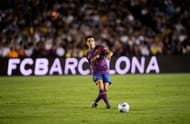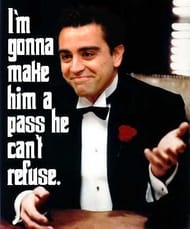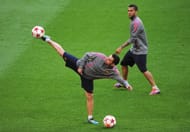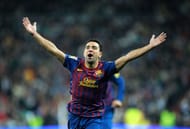In Spain, there’s a popular saying that goes, “Quien mucho abarca poco aprieta”, which roughly translates to “He who takes too much upon himself can’t do justice to all his duties”
I bet Xavi Hernandez would beg to differ.
Taking up the role of chief orchestrator, set-piece specialist, shield in front of the rearguard and captain occassionally, Xavi is one of the few who’ve almost never failed to perform on the big stage consistently. Standing at a mere 5’7″, Xavi’s dominance on the pitch contradicts his size – he imposes himself on every single move of the match, each pass, each attack, and each fallback.
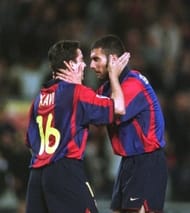
Xavi and his idol and future manager, Pep Guardiola. The two have undergone intensive comparison for their style and infuence
In the wake of the millenium, as one Catalan legend was nearing the end of his glorious career, a to-be legend was just entering the frame, still wet behind the ears. In the 1998-99 season, Spain woke up to the first signs of the legend under progress, as Louis van Gaal eased the youngster into the first team, after bouts of featuring for both the reserves and the senior team. 26 appearances and a La Liga trophy later, Xavi Hernandez had made a firm impression on all those who tuned in to Spanish football, and his ‘La Liga Breakthrough Player Of The Year’ award was to be a sign of things to come.
An injury to Pep Guardiola – Xavi’s idol and future manager – in the following season meant that the 19-year old was handed the reins as the first-choice playmaker. As expected, Xavi – whose immaculate passing and ingenious vision had already raised the bar for him – was expected to fill the not-so-small boots left by Guardiola. With comparisons between the two seeming never-ending, suddenly the 19-year old had bucketloads of expectations to fulfill – expectations that were coming in from all corners. Xavi has even admitted himself that he struggled to get rid of the comparisons, even long into his playing days.
“People initially drew constant comparisons between me and Guardiola – I struggled to shake that off. To be valued and respected for the way I play was a real battle, especially when Van Gaal used us in the same position and compared us at press conferences. It was hard having to compete against my idol.”
As life would have it, his very idol would be his true mentor, even after hanging up his boots – this time as a manager. It was Pep who helped Xavi blossom to his peak, to not only fill his own boots but to even go beyond them and create a niche of his own, overtaking the very person he’d dreamed of playing with. Xavi was no longer the ‘new Guardiola’; Guardiola was the ‘old Xavi’.
In the early 2000s, when the Catalan club was going through bankruptcy, rose Xavi the leader. One of the first names on the teamsheet, Xavi was used in a more defensive, pivot-like role, whose main objective was to break down the opposition’s attack. But Xavi has never been one to be content with one duty. Over two seasons, Xavi made 20 assists and scored 7 goals, establishing himself firmly at the club.
Fast forward a few years and there was a whole new star-studded era at Camp Nou, with the likes of Ronaldinho and Deco in midfield. But Xavi? The glam factor was high at Barcelona, but among them was a humble man that Barcelona could just not do without. As the titles came and the individual honours rolled in high in number, the ‘stars’ faltered, but the humble man kept doing what he did best. The humble man fought on; he was never comfortable in the glamour section, and never wanted to venture there either. A man never spotted at late-night clubs or high-end parties, Xavi is the quintessence of keeping your head down and working.
2008 arrived, and the world was finally beginning to notice Xavi. Instrumental in Spain’s Euro triumph – their first trophy in more than 60 years – and voted Best Player Of The Tournament (quite rightly), people were finally starting to appreciate the importance of Xavi in rotating the cogs that made the team work. Providing the assist for Fernando Torres‘ decisive goal in the finals, the Catalan quite literally ran rings around the Germans. Xavi was vital to Barcelona’s treble in the 2008-09 season, making the tackles, sending the through balls and pulling the strings that made Barcelona click. 29 assists later, Xavi was finally getting the share of limelight he’d always deserved.
And then there was the infamous ‘The World’s Best Players… and Xavi’ caption that one popular newspaper gave after the Catalan midfielder was one of five nominees for the FIFA World Player Of The Year. Disrespectful? Definitely. Did it affect Xavi? Not one bit.
2009 came, and he was back to what he does best, giving his blood and sweat for Barcelona. Xavi was in many ways Pep Guardiola’s translator to the team. What the coach wanted, Xavi delivered and moreover, made his teammates deliver. The sheer intelligence of this man was perhaps the most vital reason behind Barcelona’s supposed invincibility.
In the following years, trophies seemed to stick to Barcelona like iron to a magnet, and Xavi rarely missed a match. The Catalans were a goal-scoring machine and though most of their goals were scored by Messi, the main force behind these goals were Xavi, who was involved at some point in the movement leading to every single one of those goals.
The 2010 World Cup was one in which we saw Xavi replicate his club form for Spain, and it was not hard to see why his presence in the Barcelona midfield has culminated in so many trophies. A 90% pass completion rate over the course of the tournament, 80.2 km covered, and most importantly, the World Cup won.
A journalist had this to say about Xavi following a series of masterclass performances: “Quite simply the best midfielder of modern era. World class for several years now, it is the past three seasons in particular where the 30-year-old has been untouchable. Xavi’s passing is up there with Platini, he creates countless goals with genius through balls while virtually never relinquishing possession.”
The summer of 2011 saw the return of Cesc Fabregas to Barcelona and the uprising of Thiago Alcantara. They said Xavi’s time was over, that he’d soon be dropped to the bench while the youngsters took hold of the side’s central midfield. What did happen? Xavi just grew in stature, and as the youngsters failed to perform on occassion, one man was always there to save the day. One man always put in the perfect shift. December of 2011, at the Club World Cup, we saw Xavi – all 31 years of him – provide a magical assist for Lionel Messi. He controlled the ball with his ankle, after which he sent a perfectly weighted ball to Lionel Messi, who duly scored.
The following summer, Xavi again led Spain to another Euro victory, and now the senior most player in a highly talented midfield, his experience on the field proved invaluable. Providing two assists in the final against Italy, he proved to us that he has perhaps been one of the most consistent players ever, playing an identical through ball for Torres to score. Deja vu, much?
He isn’t the biggest of players. He isn’t the fastest. He isn’t the most skilled in terms of flashy feints or snazzy turns. But what he doesn’t have, he makes up for with his unbelievable passing range and impeccable vision, not to mention a high stamina and the highest work rate. Watching him send in a long ball that cuts through the opponent’s defence like a well-sharpened machete is simply orgasmic. For all his talents, he doesn’t even need to run on field, such is the confidence he himself holds in his ball control. He can walk past players – the ball remains glued to the feet in such fashion.
Mr. Consistent has 708 appearances for Barcelona B and Barcelona combined, and 117 for Spain, with over 180 career assists and 93 career goals. Xavi is the Spanish player to have won the most number of trophies, ahead of the likes of Iker Casillas and Carles Puyol. He still remains an untouchable, un-sackable cog in the Barcelona midfield with 7 assists to his name already this season. A Barcelona Greatest XI without Xavi would just be wrong. Apparently, the first instruction a manager gives his team when they’re playing Barcelona is to lock and limit Xavi’s movement, and not Messi’s. Because when you close up Xavi, Messi’s – why, everyone else’s – movement automatically follows suit.
But Xavi doesn’t reserve all plaudits for himself: “Without the players making good moves for me, without the control of the ball I’ve been taught throughout my career then my passes would be nothing.”
Xavi is one player who has never seen the smoke of controversy, never seen at clubs, never seen in a fight on field. His calm head and air of composure is perhaps one of the reasons behind his success. A Barcelona player for 21 years now, Xavi’s possession of the ‘Barca DNA’ is another reason why his status at Camp Nou goes beyond legendary, as Pep Guardiola pointed out:
“Xavi is a player who has the Barcelona DNA: someone who has the taste for good football, someone who is humble and someone who has loyalty to this club; from the first moment I saw him play, I knew he would become the brain behind Barcelona for many years to come. He plays very well, much better then I ever played, even when I was at my best.”
“You must become more than just a man in the mind of your opponent,” said R’as Al Ghul in the first instalment of the Batman trilogy. And Xavi, I have to say, is perhaps the perfect embodiment of someone who has achieved that. Despite a measly height of 170 cm, Xavi makes up for it with his Colossus-like presence on field.
Xavi Hernandez is definitely more than a man in the minds of anyone who faces him on field, he is the ‘Puppet Master’.
Xavi Hernandez is the engine, brakes and steering wheel – all in one.
Xavi Hernandez is the Master Orchestrator.
